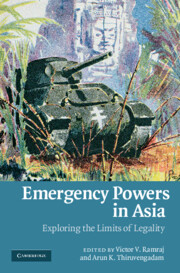Book contents
- Frontmatter
- Contents
- List of contributors
- Preface
- 1 Introduction: emergency powers and constitutionalism in Asia
- PART I Perspectives from legal and political theory
- PART II Postcolonial and post-conflict transitions
- PART III Emergencies, executive power and constitutional order
- 10 Emergency powers and the rule of law in Indonesia
- 11 Emergency powers with a moustache: special powers, military rule and evolving constitutionalism in Thailand
- 12 Emergency powers and the limits of constitutionalism in Japan
- 13 States of exception in an exceptional state: emergency powers law in China
- PART IV The role of the courts
- Index
- References
13 - States of exception in an exceptional state: emergency powers law in China
from PART III - Emergencies, executive power and constitutional order
Published online by Cambridge University Press: 04 August 2010
- Frontmatter
- Contents
- List of contributors
- Preface
- 1 Introduction: emergency powers and constitutionalism in Asia
- PART I Perspectives from legal and political theory
- PART II Postcolonial and post-conflict transitions
- PART III Emergencies, executive power and constitutional order
- 10 Emergency powers and the rule of law in Indonesia
- 11 Emergency powers with a moustache: special powers, military rule and evolving constitutionalism in Thailand
- 12 Emergency powers and the limits of constitutionalism in Japan
- 13 States of exception in an exceptional state: emergency powers law in China
- PART IV The role of the courts
- Index
- References
Summary
The puzzle of emergency powers law in a ‘Chinese-style’ regime
Laws governing emergency powers are a puzzle in China and similar systems. Despite changes since the Reform Era began in the late 1970s, China remains an authoritarian regime without a robust rule of law, strong constitutional restraints on state power and reliable legal protections for citizens' rights. Laws authorising or defining extraordinary authority are not the significant and controversial matters that they often are elsewhere, especially in liberal constitutional democracies.
A regime of China's type (at least in pure form) operates in a permanent, but almost never declared, state of emergency. Laws conferring special powers seem superfluous. China does not have the aspirationally or episodically liberal, democratic, rule-of-law constitutional order that Albert Chen, Raul Pangalangan, H. P. Lee, Andrew Harding and other contributors to this volume describe as partly explaining frequent or lasting – if legally hard to justify – states of emergency in many Asian states. Even this dilute form of what David Dyzenhaus calls a ‘compulsion of legality’ would seem to have little purchase for PRC rulers.
Conversely, a regime of China's type cannot easily bind itself to the mast. Laws articulating preconditions for extraordinary powers or restricting their scope seem meaningless. In China's constitution and politics, courts do not play the vigorous role in policing such legal commitments that judiciaries are – or were – expected to perform in Western constitutional democracies, or the modestly constraining role that Arun K. Thiruvengadam envisions emerging in some Asian states in his chapter.
Information
- Type
- Chapter
- Information
- Emergency Powers in AsiaExploring the Limits of Legality, pp. 342 - 390Publisher: Cambridge University PressPrint publication year: 2009
References
Accessibility standard: Unknown
Why this information is here
This section outlines the accessibility features of this content - including support for screen readers, full keyboard navigation and high-contrast display options. This may not be relevant for you.Accessibility Information
- 3
- Cited by
